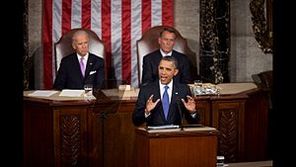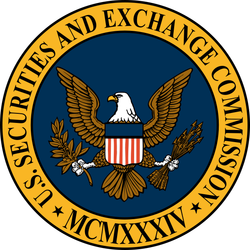 President Barack Obama discusses his jobs plan
President Barack Obama discusses his jobs plan As the crowdfunding community and U.S. capital markets sector at large await the final rules and regulations that will effectuate the remaining portions of the Jumpstart Our Business Startups Act (JOBS Act), the staff of the SEC’s Division of Corporation Finance has issued additional guidance in relation to the broker-dealer registration exemption in Title II of the JOBS Act via a “frequently asked questions” (FAQs). This note will attempt to explain the exemption, in light of the new release by the SEC, and highlight the significance of this portion of the JOBS Act.
 Seal of the U.S. Securities and Exchange Commission.
Seal of the U.S. Securities and Exchange Commission. A great deal of electronic ink has been spilled over Title III of the JOBS Act, which is perhaps justifiable given the potential magnitude of the new equity crowdfunding market in the United States and abroad. However, the argument can be made that, in the short and medium term, Title II has the potential to have a much larger impact on capital markets in the United States and on the ability of early stage but established companies to raise capital to fuel their growth.
Background
Title II of the JOBS Act (i) calls for the removal of the prohibition on general solicitation and general advertising in relation to securities offerings pursuant to Rule 506 of the Securities Act of 1933 (the “Securities Act”) (i.e. offerings to accredited investors only), and (ii) created exemption from broker-dealer registration for entities engaged only in Rule 506 offerings.
Although the prohibition on general solicitation and advertising has yet to be lifted, the exemption from broker-dealer registration is currently effective and may be relied upon to establish platforms before the SEC adopts rules to eliminate the ban on general solicitation. As such, first movers have the opportunity to take advantage of the new rules now.
Who needs to register as a broker-dealer?
Subject to certain exemptions, broker-dealer registration is required for any person who, through the use of interstate commerce (which would include the telephone, the internet, or e-mail), is in the business of offering or selling securities or effecting securities transactions. In practice, this definition is extremely broad and captures the activities of individuals, companies, venture capital groups and others that are often unaware that their actions could trigger the requirement to register as a broker-dealer.
Registration is time-consuming, costly and followed by ongoing record keeping and reporting requirements that unrealistic for individuals, companies or other market participants that are not primarily engaged in securities transactions.
What exemption from registration has been created by Title II of the JOBS Act?
Under Section 201(c) of the Act, intermediaries participating solely in Rule 506 offerings are exempt from broker-dealer registration provided that certain conditions are met. A Rule 506 intermediary is not required to register as a broker-dealer in the event that the intermediary only:
What was the most important point that came to light via the SEC’s FAQs?
As detailed further below, the FAQs helpfully clarified a number of questions that had been floating around the market since passage of the JOBS Act. But perhaps the most useful information provided was the SEC staff’s belief that the prohibition on the intermediary from receiving any compensation in relation to the offering of securities, practically speaking, “makes it unlikely that a person outside the venture capital area would be able to rely on the exemption from broker-dealer registration.”
Time will tell whether savvy market participants can structure an investment model to take advantage of what is effectively a co-investment strategy but the “venture capital area” could certainly include, at the start, clever start-ups utilizing this exemption in combination with the lifting of the ban on general solicitation and advertising), once it is effective. Indeed, the staff noted that, assuming the rest of the requirements are satisfied, a person associated with an issuer of securities could maintain a platform or mechanism for the issuer’s securities (though it remains unclear how this situation would not fall afoul of the prohibition on compensation).
What else did the staff comment on?
The SEC staff touched on a number of points which helped to clarify the intention and limitation of the broker-dealer exemption set out in Title II of the JOBS Act. Some of the more salient points are set out below:
Conclusion
Although the FAQs released by the SEC on the new broker-dealer exemption created by the JOBS Act were not revolutionary, the staff did provide a few helpful clarifications. In particular, it will be interesting to see whether venture capital groups and/or savvy issuers recognize the potential provided by the new exemption from broker-dealer registration and seek to establish a presence in the market, particularly in preparation for the post-general solicitation prohibition world in which they will have access to a much larger pool of potential investors.
Background
Title II of the JOBS Act (i) calls for the removal of the prohibition on general solicitation and general advertising in relation to securities offerings pursuant to Rule 506 of the Securities Act of 1933 (the “Securities Act”) (i.e. offerings to accredited investors only), and (ii) created exemption from broker-dealer registration for entities engaged only in Rule 506 offerings.
Although the prohibition on general solicitation and advertising has yet to be lifted, the exemption from broker-dealer registration is currently effective and may be relied upon to establish platforms before the SEC adopts rules to eliminate the ban on general solicitation. As such, first movers have the opportunity to take advantage of the new rules now.
Who needs to register as a broker-dealer?
Subject to certain exemptions, broker-dealer registration is required for any person who, through the use of interstate commerce (which would include the telephone, the internet, or e-mail), is in the business of offering or selling securities or effecting securities transactions. In practice, this definition is extremely broad and captures the activities of individuals, companies, venture capital groups and others that are often unaware that their actions could trigger the requirement to register as a broker-dealer.
Registration is time-consuming, costly and followed by ongoing record keeping and reporting requirements that unrealistic for individuals, companies or other market participants that are not primarily engaged in securities transactions.
What exemption from registration has been created by Title II of the JOBS Act?
Under Section 201(c) of the Act, intermediaries participating solely in Rule 506 offerings are exempt from broker-dealer registration provided that certain conditions are met. A Rule 506 intermediary is not required to register as a broker-dealer in the event that the intermediary only:
- maintains a platform or mechanism that permits the offer, sale, purchase, negotiation, general solicitation, advertisements, or similar activities in connection with the offering;
- co-invests in securities being offered; or
- provides ancillary services in connection with the offering.
- receives compensation in connection with the purchase or sale of securities in the offering; or
- possesses customer funds or securities in connection with the offering.
What was the most important point that came to light via the SEC’s FAQs?
As detailed further below, the FAQs helpfully clarified a number of questions that had been floating around the market since passage of the JOBS Act. But perhaps the most useful information provided was the SEC staff’s belief that the prohibition on the intermediary from receiving any compensation in relation to the offering of securities, practically speaking, “makes it unlikely that a person outside the venture capital area would be able to rely on the exemption from broker-dealer registration.”
Time will tell whether savvy market participants can structure an investment model to take advantage of what is effectively a co-investment strategy but the “venture capital area” could certainly include, at the start, clever start-ups utilizing this exemption in combination with the lifting of the ban on general solicitation and advertising), once it is effective. Indeed, the staff noted that, assuming the rest of the requirements are satisfied, a person associated with an issuer of securities could maintain a platform or mechanism for the issuer’s securities (though it remains unclear how this situation would not fall afoul of the prohibition on compensation).
What else did the staff comment on?
The SEC staff touched on a number of points which helped to clarify the intention and limitation of the broker-dealer exemption set out in Title II of the JOBS Act. Some of the more salient points are set out below:
- The exemption from registration is only available if the securities are offered and sold in Rule 506 offerings. The exemption is therefore not available if an intermediary utilizes other private placement exemptions (such as Rule 504, Rule 505 or 144A).
- General solicitation or general advertising is still prohibited, even in relation to marketing a Rule 506 offering on an intermediary’s platform.
- Although intermediaries that engage in only the activities noted in Title II are exempt from having to register as broker-dealers, they are not excluded from the definition of “broker-dealer”. Therefore, they may be required to register as broker-dealers if they engage in other activities that trigger a requirement to register.
- The exemption provided in the JOBS Act does not exempt intermediaries from the applicable state securities laws. Intermediaries will need to consider whether their activities trigger state broker-dealer registration requirements.
- The prohibition on receiving compensation has been interpreted very broadly by the staff and is not limited to transaction-linked compensation. However, since co-investment in the securities offered by the intermediary is expressly permitted, any associated profits will not be considered to be “compensation” for purposes of the exemption.
Conclusion
Although the FAQs released by the SEC on the new broker-dealer exemption created by the JOBS Act were not revolutionary, the staff did provide a few helpful clarifications. In particular, it will be interesting to see whether venture capital groups and/or savvy issuers recognize the potential provided by the new exemption from broker-dealer registration and seek to establish a presence in the market, particularly in preparation for the post-general solicitation prohibition world in which they will have access to a much larger pool of potential investors.

 RSS Feed
RSS Feed